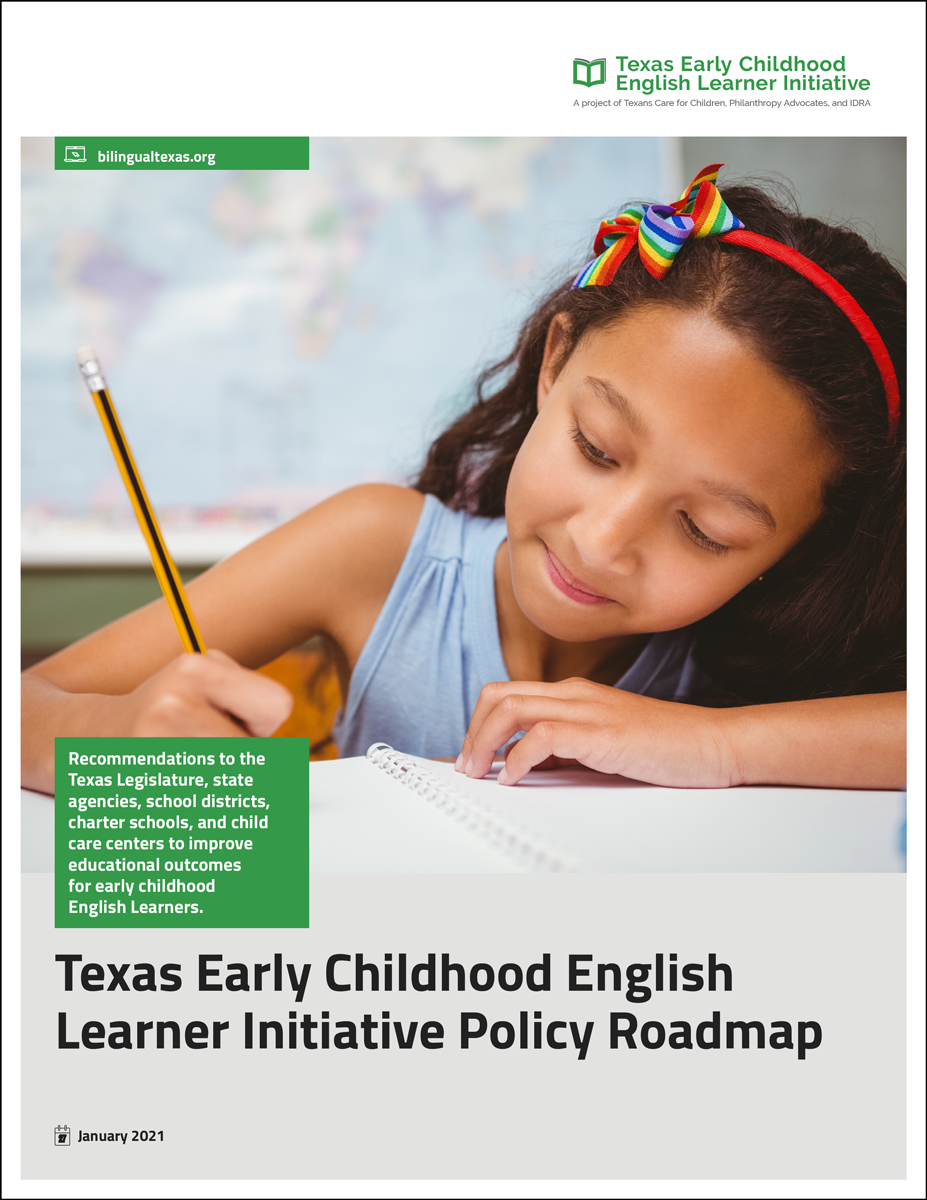
For Immediate Release
Contact: Peter Clark, 512-473-2274, pclark@txchildren.org
Groups Release Policy Roadmap to Build on Pre-k Gains in HB 3, Respond to COVID, and Ensure English Learners Are Strong Readers by 3rd Grade

Austin – Today a number of Texas organizations announced the new Texas Early Childhood English Learner Initiative and a Policy Roadmap with recommendations for ways the Legislature, state agencies, school districts, charter schools, and child care centers can ensure that more young English Learners are successful. The Initiative’s goals are to ensure more English Learner students become strong readers by third grade, become fluent and literate in both English and their home language, and are learning in settings where educators, principals, child care directors, and parents have the tools they need to support them during this precious period of childhood.
The Initiative is led by a Steering Committee composed of Texans Care for Children; Intercultural Development Research Association (IDRA); Philanthropy Advocates, a collaboration with Educate Texas; Texas Association for the Education of Young Children (TAEYC); and Dr. Dina Castro of the University of North Texas at Denton. From January through October 2020, the Initiative developed its recommendations through a statewide survey of 185 experts in bilingual and early childhood education, three virtual workgroup convenings with community leaders from around the state, and numerous conversations with education program leaders and stakeholders.
The Initiative launched a new website, bilingualtexas.org, with a Policy Roadmap that offers recommendations that focus on four key areas: improving the quality of early learning programs, strengthening the workforce, collecting better data, and retooling school finance.
“To make the most of the great steps the Legislature took on pre-k last session, we need to have smart strategies in place for educating English Learners,” said Jennifer Esterline, Director of Philanthropy Advocates, formerly known as TEGAC. “The recommendations we’re releasing today — based on months of listening to educators, researchers, and other experts — will help the Legislature meet its goal of ensuring Texas kids are strong readers by third grade.”
In 2019, the Legislature passed a major school finance bill, HB 3, that included provisions to fund full-day pre-k for eligible students and to expand the use of Dual Language Immersion (DLI) programs to improve students’ reading ability by third grade. English Learners account for 28 percent of students in pre-k through third grade in Texas public schools. The state defines an English Learner as “a student whose primary language is not English and whose English language skills are such that the student has difficulty performing ordinary classwork in English.”
“English learners’ path to graduation starts when they first walk into an early childhood classroom, but only one in 12 emergent bilingual students graduates college-ready in this state,” said Celina Moreno, President and CEO of IDRA.
“Improving Texas policies for young English learners is especially urgent now that the COVID-19 pandemic has socially isolated children and interrupted student learning, especially in early grades,” Ms. Moreno explained.
During the COVID-19 pandemic, not only is online learning more difficult for the youngest students, but many students in early grades have not even enrolled in school. For example, TEA recently reported that pre-k enrollment declined 22 percent during the first semester of the current school year.
“Bilingual children have always made up a significant portion of the population of Texas public schools and early childhood programs,” said Dr. Dina Castro of UNT Denton. “Educators have tried a lot of different strategies over the years, but now we have clear research about which strategies and models work best for these students. The use of students’ two languages to support their development and learning is the most effective way, and this means that dual language education should be expanded. The fact is that early childhood is the time when the brain is best equipped to acquire two or more languages, thus, access to bilingual learning should begin then.”
The report’s recommendations to the Legislature include creating a state strategic plan to cultivate bilingualism across all early learning systems; adopting a uniform process across early childhood systems to identify English Learner children and collect data; creating a teacher certification in Bilingual Special Education; and updating school finance formulas to reflect the cost of educating English Learners.
The report also offers recommendations to TEA and other state agencies, including the recommendation to continue to identify English Learners in the state’s education database after they exit a bilingual education or ESL program in order to better track their progress and evaluate the efficacy of different strategies.
The report recommends that school districts, charter schools, and child care providers recognize bilingualism and biliteracy as strengths and implement research-based teaching practices that support their development; work to recruit, hire, retain, and promote bilingual and multilingual staff; and take other steps outlined in the report.
Recommendations to school districts and charter schools include expanding the use of Dual Language Immersion programs, which have proven more effective than other programs and models for English Learners, and instituting student progress monitoring that goes beyond measuring English proficiency.
“If you’re trying to make sure Texas is smart about pre-k and smart about growing strong readers in elementary school, then one of the first things you need to do is look at the research about how to effectively serve the large number of English Learners in these grades,” said David Feigen, Early Childhood Policy Associate at Texans Care for Children. “We want to make sure schools are helping kids master English and their home language, recognizing that their bilingualism is an asset for themselves, for their school, and ultimately for our state as we compete in a multilingual economy.”
“Early childhood experiences — in the home, child care, pre-k, and other early grades — provide the foundation for success in later grades and later in life,” said Kim Kofron, Executive Director of the Texas Association for the Education of Young Children. “If policymakers want kids to do well in elementary school, they need to make sure the state has strong child care policies in place. We’re excited to work with state leaders and child care directors to pursue these recommendations and make the most of the early years for English Learners.”
The Initiative’s research was produced with the generous support of Philanthropy Advocates, a collaboration with Educate Texas.



